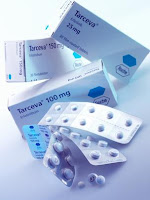
OSI Pharmaceuticals, Inc. announced that the U.S. Food and Drug Administration (FDA) has accepted for filing and review the supplemental New Drug Application (sNDA) for the use of Tarceva® (erlotinib) as a first-line maintenance treatment for patients with advanced non-small cell lung cancer (NSCLC) who have not progressed following first-line treatment with platinum-based chemotherapy. Based upon the March 17th receipt of filing the FDA Prescription Drug Fee Act (PDUFA) review date will be on or about January 18, 2010.
"We are pleased with the FDA's decision to review the data to evaluate Tarceva as a first-line maintenance therapy," stated Colin Goddard, Ph.D., Chief Executive Officer of OSI Pharmaceuticals. "This decision puts us one step closer toward accomplishing our goal of making Tarceva available earlier in the course of lung cancer treatment, offering a non-chemotherapy choice for all NSCLC patients in the maintenance setting."
The sNDA filing is based on a pivotal Phase III placebo-controlled, randomized, double-blind trial known as SATURN. On May 14, 2009, OSI announced data from the SATURN study, which was formally presented at the 45th Annual Meeting of the American Society of Clinical Oncology on May 31, 2009 in Orlando, Fla.
About SATURN
SATURN is an international, placebo-controlled, randomized, double-blind, Phase III study conducted by Roche that enrolled 889 patients with advanced NSCLC at approximately 160 sites worldwide. Patients were treated with four cycles of standard first-line platinum-based chemotherapy and were then randomized to Tarceva (150 mg) or placebo if their cancer did not progress. The primary endpoint of the study was progression-free survival in the overall population, as determined by investigators, and was defined as the length of time from randomization to disease progression or death from any cause. The co-primary endpoint was PFS in patients with EGFR positive tumors by IHC. Secondary endpoints included overall survival, safety and an evaluation of exploratory biomarkers, including EGFR mutations and K-ras mutations.
The study met both of its co-primary endpoints by demonstrating a statistically significant 41% improvement in the time patients live without their disease worsening (as measured by progression free survival, or PFS) compared with placebo (Hazard Ratio = 0.71, p-value <0.00001; pfs =" 0.69," hr="0.76," value="0.0148," n="359);" hr="0.68," n="525).">
Pre-planned biomarker analyses of tissue samples collected as part of the SATURN protocol provided important information on the potential role of EGFR mutations and K-ras mutations in predicting possible outcomes of Tarceva therapy in NSCLC patients. The subgroup analysis of patients whose tumors possessed an activating EGFR mutation and were eligible for analysis (n=49) demonstrated a statistically significant ten-fold increase in the time patients live without their disease worsening (as measured by PFS) for patients treated with Tarceva compared with placebo. The hazard ratio was 0.10 (p-value <0.0001). hr="0.78," n="388).">
There were no new or unexpected safety signals observed in the SATURN study. Adverse events were consistent with those observed in previous Tarceva studies in NSCLC, and included rash (49.2% with Tarceva versus 5.8% with placebo) and diarrhea (20.3% with Tarceva versus 4.5% with placebo). Dose reductions were necessary in 11% of the patients treated with Tarceva versus 1% of those treated with placebo. Discontinuations due to adverse events were necessary for 4.6% of the patients in the Tarceva arm versus 1.6% in the placebo arm.
About Lung Cancer
According to the American Cancer Society (ACS), lung cancer is the single largest cause of cancer death among men and women in the U.S. and nearly 159,390 Americans are expected to die from the disease in 2009. Most people with lung cancer are diagnosed with advanced stage disease that cannot be surgically removed or has spread to other parts of the body. The majority of people with advanced lung cancer survive less than one year. NSCLC is the most common type of lung cancer.
About Tarceva
Tarceva is a once-a-day pill that targets the EGFR pathway. Tarceva is designed to inhibit the tyrosine kinase activity of the EGFR signaling pathway inside the cell, one of the critical growth factors in NSCLC and pancreatic cancers. Tarceva is indicated as a monotherapy for patients with locally advanced or metastatic NSCLC whose disease has progressed after one or more courses of chemotherapy. Results from two multicenter, placebo-controlled, randomized Phase III trials conducted in first-line patients with locally advanced or metastatic NSCLC showed no clinical benefit with the concurrent administration of Tarceva with platinum-based chemotherapy (carboplatin and paclitaxel or gemcitabine and cisplatin) and its use is not recommended in that setting. In pancreatic cancer, Tarceva is indicated in combination with gemcitabine for the first-line treatment of patients with locally advanced pancreatic cancer, pancreatic cancer that cannot be surgically removed or pancreatic cancer that has spread to distant body organs.
Tarceva Safety
There have been infrequent reports of serious Interstitial Lung Disease (ILD)-like events including deaths in patients taking Tarceva. Serious side effects (including deaths) in patients taking Tarceva include liver and/or kidney problems; gastrointestinal (GI) perforations (the development of a hole in the stomach, small intestine, or large intestine); and severe blistering skin reactions including cases similar to Stevens-Johnson syndrome. Patients taking Tarceva plus gemcitabine were more likely to experience bleeding and clotting problems such as heart attack or stroke. Eye irritation and damage to the cornea have been reported in patients taking Tarceva. Women should avoid becoming pregnant and avoid breastfeeding while taking Tarceva. Patients should call their doctor right away if they have these signs or symptoms: new or worsening skin rash; serious or ongoing diarrhea, nausea, loss of appetite, vomiting, or stomach pain; new or worsening shortness of breath or cough; fever; eye irritation. Rash and diarrhea were the most common side effects associated with Tarceva in the non-small cell lung cancer clinical study. Fatigue, rash, nausea, loss of appetite, and diarrhea were the most common side effects associated with Tarceva plus gemcitabine therapy in the pancreatic cancer clinical study.
Source : www.medicalnewstoday.com
read more»
Read more...
















